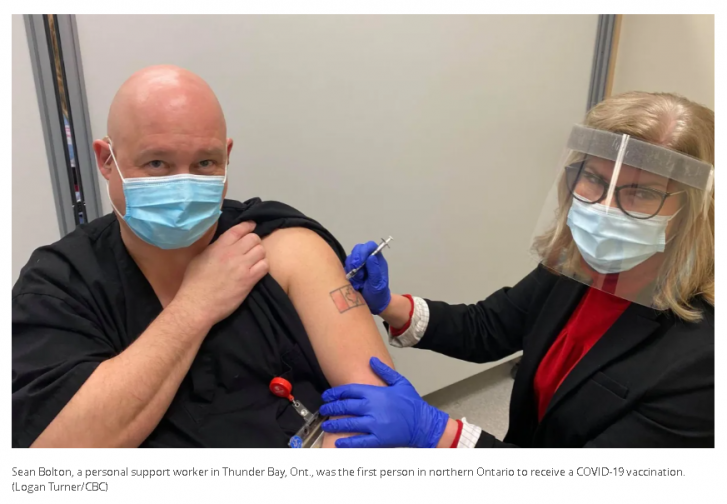Ontario government officials are considering the pros and cons of requiring COVID-19 vaccinations for health-care workplaces, CBC News has learned.
A draft provincial document obtained by CBC News reveals the government is wading through the legal and ethical issues involved in developing vaccination policies for certain employment sectors.
Although the document frequently refers to “mandatory vaccination,” the policy it ultimately recommends would not actually require any workers to be vaccinated against COVID-19. Rather, it would allow unvaccinated health-care workers to have contact with patients, provided that they wear full protective equipment (PPE) and undergo frequent screening for the coronavirus.
“There is no suggestion that anyone be required to get a vaccine,” says the draft, which has not been approved by Premier Doug Ford’s cabinet. “The issue is whether there can be employment consequences for failure to do so.”
The document is the latest addition to the intensifying debate in Canada about the situations in which a COVID-19 vaccination should be required.
The draft, dated July 2, is from Ontario’s Ministry of Labour, Training and Skills Development. It was provided to CBC News by a source within the government.
The document lays out three options around mandatory vaccination in high-risk workplaces:
- Taking no new action.
- Extending the vaccination rules now in place for long-term care staff to all health- and group care settings.
- Requiring all workers who interact with patients or seniors in health and long-term care either to be fully vaccinated against COVID-19, or to wear full PPE and undergo regular screening.
The third option is labelled as the “preliminary recommendation.” It “protects most vulnerable clients while giving workers a choice,” says the document, which adds that this is similar to the approach taken in Quebec.
A spokesperson for Ontario’s Minister of Labour, Training and Skills Development, Monte McNaughton, declined to answer specific questions about the document, including whether the government is still actively considering its proposals.
“There has been no change in our government’s vaccination policy,” said McNaughton’s acting press secretary Ryan Whealy, in an emailed statement.
“Our vaccine rollout is making tremendous progress, and we continue to encourage everyone to book their appointments to receive their first and second doses as soon as possible.”
Ministry staff frequently draw up documents with policy options and recommendations that don’t necessarily reflect the government’s actual preferences, according to senior provincial officials.
The document says some employers are asking the government to provide clear rules on whether they can demand proof of vaccination from their workers, and whether they can require employees to be fully vaccinated.
Sticking with the status quo and not taking any new action would fail to satisfy those employers, says the document.

The policy landscape in Canada on mandatory COVID-19 vaccinations is currently piecemeal, with little in the way of overall standards being set by the provinces. That is leaving individual institutions, employers and businesses to set their own rules.
A few universities and colleges have announced some vaccination requirements for the fall, either for students living in residence or for students and staff coming to campus. Some companies are offering incentives to their employees to get vaccinated.
Provinces are also taking varying approaches to “vaccine passports” that would give the vaccinated greater access to indoor activities than those who haven’t had a COVID-19 shot.
Starting this weekend, Manitoba is opening cinemas, casinos and a CFL game only to people who are fully vaccinated. Quebec’s government has said it may restrict unvaccinated people’s access to certain facilities if COVID-19 cases surge in the fall.
However the governments of Ontario, Alberta and New Brunswick have ruled out vaccine passports entirely.
Vaccination against diseases other than COVID-19 is already a condition of employment in some sectors in Ontario.
Child-care workers must be immunized to the requirements set by local public health officers, while Ontario’s paramedics must be vaccinated against a whole range of communicable diseases. Exemptions are permitted on medical or religious grounds.
The document notes that Ontario’s new rules for long-term care staff don’t actually require vaccination against COVID-19. A minister’s directive, which took effect July 1, permits staff not to get a shot, so long as they participate in an education program about the benefits of being vaccinated.
Article From: CBC
Author: Mike Crawley

